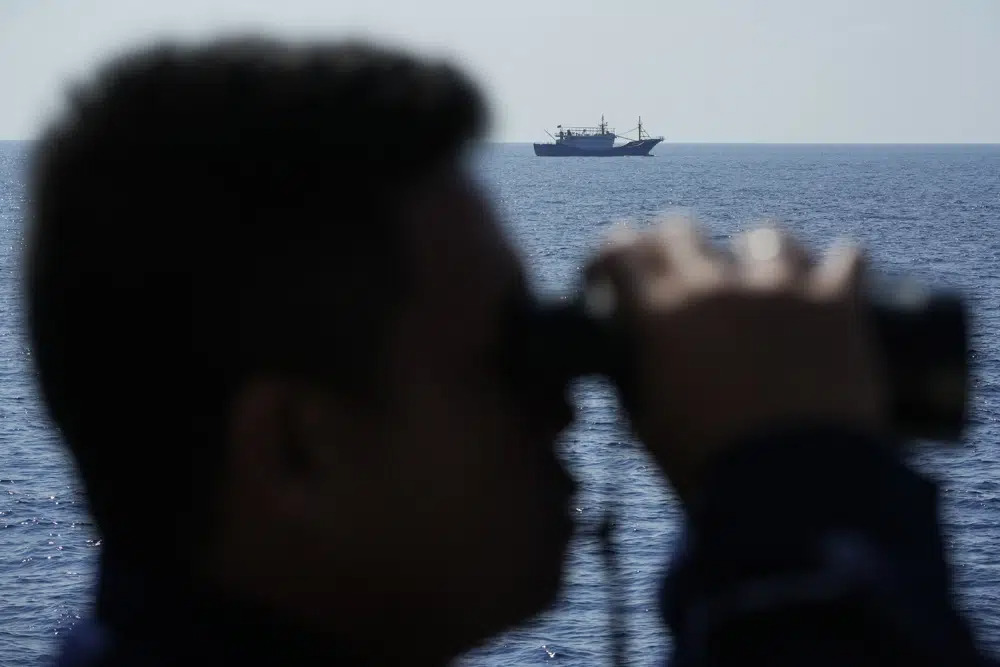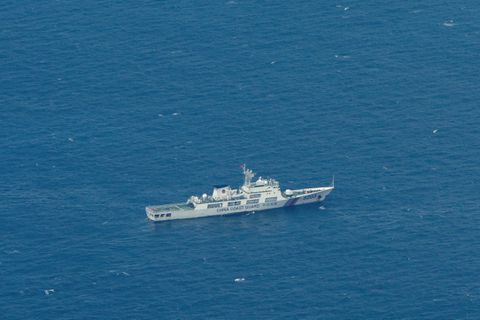Uncategorized
A tense week at sea as Philippine coast guard faces China
Recently, two Philippine coast guard warships patrolled the dangerous South China Sea.
Two weeks ago, the Philippine coast guard asked the AP and three other news agencies to join a 1,670-kilometer (1,038-mile) patrol of one of the world’s most contentious waters.
The invitation was part of a new Philippine campaign to highlight China’s growing South China Sea aggression. China has pushed back rival claims like the Philippines and created artificial islands with airstrips and military garrisons. The fishing archipelago may be atop massive oil and gas reserves.
The Philippines regularly monitor the islands to establish their claims, spot encroachments, and restock Filipino sailors. The Philippine coast guard sometimes faces David and Goliath battles against significantly larger and more powerful fleets of Chinese coast guard vessels, navy warships, and seaborne militias, especially near Beijing’s artificial island bases.
Japanese-built 44-meter (144-foot) patrol ships BRP Malabrigo and BRP Malapascua planned to circle disputed islands, islets, and reefs claimed by the Philippines in the Spratly Islands, some occupied by Philippine garrisons and some by Chinese military installations.
The expedition showed how Filipino coast guardsmen face sun, sea, stress, and solitude while fighting several geopolitical wars.
The sailors packed cellphones with photos, movies, and games.
Patrolling was hard work and claustrophobic leisure. Sailors spent most of their downtime between four-hour shifts in cramped, air-conditioned cabins because it was so hot. A few individuals would congregate in the mess hall to watch a movie or sing on the karaoke machine, a Filipino requirement. Some liked walking the ship’s narrow passages.
The two ships visited one or two destinations daily, working nonstop. Motor launches delivered water, crude oil, and cigarettes at Filipino-occupied locations. Thirsty sailors traded dried fish for water.
Visiting Chinese-controlled areas was harder. The patrol found over 100 small Chinese boats, likely militia vessels, anchored near one shoal. Filipinos lowered launches and demanded boats leave Philippine waters. Chinese boats remained silent.
They fought the Chinese Coast Guard in Chinese-occupied Subi Reef and at Second Thomas Shoal, where Filipino sailors occupy a beached, crumbling navy ship flanked by Chinese ships.
Tense, drawn-out confrontations. Chinese coast guard and navy ships followed the patrol for more than an hour, accusing the Filipinos of invading into Beijing’s territorial seas and ordering them to leave or face unspecified consequences.
A radio operator carrying a paper script in the bridge corner declared Philippine sovereignty and ordered the Chinese ships to stay away and follow international anti-collision norms.
The bridge was silent and attentive. Radar operators watched the other ship’s speed and bearing for minute changes. The commander ordered the Malabrigos to speed up one knot when it neared. The encounter lasted almost an hour.
Commander Julio Colarina III, 41, spent 24 hours a day atop the Malabrigo’s bridge, sleeping on a foldable bed. Second-generation Philippine territorial defender. His retired naval father garrisoned Philippine-occupied Thitu Island for a year in the 1970s.
The mess hall played “Hotel California” while crew members rested between four-hour bridge shifts. A sailor celebrated her birthday with an omelet, sardines, fried fish, and rice.
“Peace and good health always,” stated the 27-year-old.
The Malapascua was stopped by a Chinese coast guard ship on April 23, the second-to-last day of the voyage, when the crew became silent. Capt. Rodel Hernandez of the Malapascua says he avoided a collision by rapidly reversing course and shutting off the engine.
Manila-Beijing tensions escalated as journalists filmed the violent confrontation. The Philippines accused China of “highly dangerous maneuvers” that threatened Philippine patrol vessels and crews.
China said the Filipino warships entered its territorial seas with journalists in a “premeditated provocation designed to deliberately create a friction” to blame Beijing.
Petty Officer 2nd Class Reggie Lobusta, who has been deployed to the disputed zone many times, felt like he had just finished another round in a protracted boxing battle with no end in sight.
“These problems will be far worse than what we’ve encountered if they’re not addressed properly,” Lobusta warned.
Patrols are the Philippine Coast Guard’s hardest jobs. Colarina claimed the crew received half a month’s wages as hazard pay and a “stress debrief” from psychiatrists after returning to land.
After seven days, more crewmembers chatted and took selfies on the deck as the sun sank.
Lobusta claimed sunsets, sunrises, dolphins, and green turtles enhance morale. “Retiring and leaving this ship and my second family will break my heart.”
Uncategorized
Israeli attacks in Gaza add to the heavy Palestinian toll in the war on Hamas.
Israeli attacks in Gaza add to the heavy Palestinian toll in the war on Hamas. Israeli forces bombarded the central region of Gaza by land, sea, and air. Palestinian officials claimed scores more casualties, and the United Nations health agency stated that thousands of Palestinians were attempting to leave the fighting.
Israel has not wavered in its determination to eradicate the Palestinian militant group Hamas as a reaction to the terrorist organization’s attack on Israel on October 7. This is the case, although international requests have been made for a ceasefire and an improvement in the deteriorating humanitarian situation in the Gaza Strip.
Late on Wednesday, medical personnel reported that Israeli aircraft had carried out three attacks in the Al Nuseirat neighborhood of central Gaza, resulting in the deaths of seven people and injuries to numerous more.
The World Health Organization of the United Nations said that its personnel had witnessed tens of thousands of civilians escape severe strikes in Khan Younis and the Middle Area by walking, riding donkeys, or driving into vehicles. A statement made on Wednesday stated that improvised shelters were being constructed along the road.
On the diplomatic front, where international pressure on Israel has increased, French President Emmanuel Macron sent a call to Israeli Prime Minister Benjamin Netanyahu, in which he emphasized the necessity of working for a truce that is both long-lasting and sustainable with the assistance of regional and international allies, according to the French Presidency.
An Israeli bombardment on Wednesday near Al-Amal Hospital in Khan Younis, which is located in the southern Gaza Strip, resulted in the deaths of twenty Palestinians, according to a statement released by the Gaza Ministry of Health. Immediately after the incident, the Israeli military did not provide any remarks.
Medical personnel said that one airstrike resulted in the deaths of five Palestinians in the Al-Maghazi region of central Gaza. Meanwhile, health authorities reported that seven Palestinians’ bodies arrived at Al Shifa Hospital in Gaza City, which is located to the north as well.
As night fell, residents in the central Gaza Strip said that Israeli tank bombardment intensified east of Al-Bureij and Al-Maghazi, which is the area where tanks have been attempting to force their way through.
An increase in Israeli Army casualties
The Israeli military said on Wednesday that three more troops had been killed in action in Gaza, raising the total number of military casualties to 166 since the beginning of ground operations on October 20.
On October 7, the worst day in Israel’s history, Hamas carried out a cross-border rampage that resulted in the deaths of 1,200 people and the kidnapping of 240 hostages. This led to the outbreak of war. The response of the Netanyahu administration has destroyed a significant portion of Gaza, which Hamas administers.
According to the Gaza health ministry, the number of Israeli assaults that resulted in deaths and injuries in the enclave was 21,110 lives lost and 55,243 people injured.
It is estimated that nearly all of Gaza’s 2.3 million residents have been forced to leave their homes.
BLOODLINES OF VIOLENCE
Several countries in the Middle East and the West have expressed concern over the war’s expansion, which now includes the northern border between Israel and Lebanon. According to sources inside the security sector, Hezbollah launched a more significant number of rockets and drones armed with weapons on Wednesday than it has on any other day.
The cabinet minister, Benny Gantz, stated that the situation must be changed. The Israeli military has stated that its airplanes have hit military positions belonging to Hezbollah as well as other locations in Lebanon.
During a news conference, he stated, “The Israel Defense Forces will do it if the world and the Lebanese government do not act in order to prevent the firing on Israel’s northern residents and to distance Hezbollah from the border.” He was alluding to the Israeli military.
In Washington, Vice President Joe Biden stated that the purpose of the United States military strikes that took place in Iraq on Monday was to discourage Iran and militia groups that Iran supports from launching attacks against American personnel and bases. Three Americans suffered injuries as a result of an earlier Monday drone attack by militants with ties to Iran.
Since the beginning of the war, there has been an increase in the number of confrontations that have taken place between Israeli forces and Palestinians in the occupied West Bank. According to the Palestinian health ministry, a drone strike that occurred on Wednesday during an Israeli raid in Tulkarm killed six Palestinians.
Israeli military forces came under attack from militants in that area during a counterterrorism operation, who threw explosive devices at them. The Israeli military has denied any involvement in the attack. An Israeli Air Force aircraft was said to have struck the individuals who carried out the attack.
The conflict occurred in the Nour Shams refugee camp in Tulkarm, a city considered a flashpoint due to its location on one of the primary crossing points into the West Bank.
Witnesses say the six men slain were seated together in the early hours of the morning but were not involved in fights with Israeli soldiers.
“We heard the sound and the screaming; our house is nearby so we came out to see,” said Izzaldin Assaili, a local who lives nearby.
Uncategorized
Russians are banned from traveling and must hand over passports within five days.
By a regulation issued by the government that will go into effect on Monday, Russian citizens who have been prohibited from traveling outside the country will be required to hand over their passports to the authorities within five days of receiving notification of the restriction.
A travel ban can be imposed by the authorities in Russia on a variety of individuals, including conscripts, employees of the Federal Security Service (FSB), convicted individuals, and anyone who have access to state secrets or “information of special importance,” amongst other categories of individuals.
The passport that has been returned will be kept in storage by the authority that issued it, such as the authorities employed by the Ministry of the Interior or the Ministry of Foreign Affairs.
Therefore, by the order issued by the government, the passport may be restored following the completion of an application after the travel ban has been lifted.
According to the resolution, those whose freedom to travel was temporarily restricted because they were required to serve in the military or an alternative civilian capacity would be required to present further a military identification card that includes evidence that they have finished their duty.
The Financial Times reported in March, citing unidentified people close to the situation, that Russia’s security services were taking the passports of top officials and executives of state companies to prohibit them from traveling outside the country.
POLITICS
China’s Li promotes greater cooperation with Indonesia.
Chinese Premier Li Keqiang has advocated for greater cooperation between China and Indonesia, emphasizing the importance of strong bilateral ties. This article delves into the significance of Li’s visit and the potential areas of cooperation between these two Asian nations.
Chinese Premier Li Keqiang has embarked on a mission to enhance cooperation and strengthen diplomatic ties between China and Indonesia. China and Indonesia hold significant regional influence, and their cooperation can have far-reaching implications in Southeast Asia and beyond.
Economic collaboration is a key focus of discussions, with trade and investment central to the bilateral relationship. Infrastructure development projects like the Belt and Road Initiative may offer joint ventures and partnership opportunities. Cooperation on maritime issues, including security and trade, is of mutual interest, given Indonesia’s strategic location.
Enhancing people-to-people exchanges, such as cultural programs and educational partnerships, can strengthen the bonds between the two nations.
China’s relations with Southeast Asian countries like Indonesia have geopolitical significance, with both nations navigating complex regional dynamics. Collaboration between China and Indonesia can contribute to regional stability and economic growth in Southeast Asia.
Both nations face shared challenges, including environmental concerns and the need for sustainable development.
In conclusion, Chinese Premier Li Keqiang’s visit to Indonesia underscores the commitment of both nations to strengthening their bilateral ties. The potential for enhanced economic cooperation, infrastructure development, and collaboration on regional and global issues paves the way for a deeper and more impactful relationship. As these two influential Asian nations explore areas of mutual interest and address shared challenges, their partnership can shape Southeast Asia and contribute to regional stability and prosperity.










